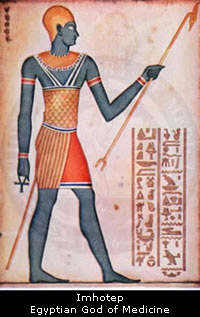EGYPTIAN ROOTS
The Origins of Greek Medicine
The ancient Greeks didn't invent the art of medicine; rather, they had a large body of preexisting medical lore and knowledge to draw on. Their distinctive genius lay in their ability to distill and refine all this medical knowledge into a new systematization and synthesis.
Most medical historians now agree that the main source and reservoir of medical knowledge that the ancient Greeks drew upon came from Egypt, whose civilization was already old and well-established as the Golden Age of classical Greece was dawning. But exactly how this medical knowledge was transmitted from Egypt to Greece is still disputed.
 Many medical scholars maintain that the Minoan civilization on Crete served as the intermediary in this transmission. But two other figures also stand out in this regard: Pythagoras and Thales. Pythagoras is known to have traveled widely, and Thales received his medical training in Egypt.
Many medical scholars maintain that the Minoan civilization on Crete served as the intermediary in this transmission. But two other figures also stand out in this regard: Pythagoras and Thales. Pythagoras is known to have traveled widely, and Thales received his medical training in Egypt.
As with Greek Medicine, the origins of Egyptian Medicine lie in religion and spirituality. The Egyptian god of medicine was Imhotep, whose basic role and function roughly corresponded to that of Asclepius. Prayers and supplications were made to him and other gods for healing intercessions, and it was believed that the gods intervened in matters of health and disease.
In spite of these religious origins, Egyptian Medicine was mostly rational and scientific. Blood was considered to be an important nutritive and regulatory substance, and the heart was considered to be the center of the circulatory system. The influence of respiratory patterns on blood circulation was also widely recognized.
The ancient Egyptians wrote many medical papyri, which were filled with medical recipes that were attributed to Imhotep, the legandary god and founder of their medical system. Other medical papyri discuss the effects of various drugs and the classification and systematization of diseases and their symptoms. The most famous of these medical papyri is the Ebers Papyrus.
The personal hygiene of the ancient Egyptians was impeccable. They bathed twice a day and anointed themselves with perfumes and medicated oils. They boiled their water to sterilize it before drinking, and never ate pork, as it was considered to be unclean. For similar reasons, women never engaged in sex during their menstrual periods.
Specialists abounded for just about every field of medical practice. Each part of the body had its own specialist who attended to it.
Acknowledgements:
Traditional Greco-Arabic and Modern Western Medicine: Conflict or Symbiosis?
by Hakim Mohammed Said Copyright 1975 by Hamdard Academy - Karachi, Pakistan
pp. 2 - 4
















